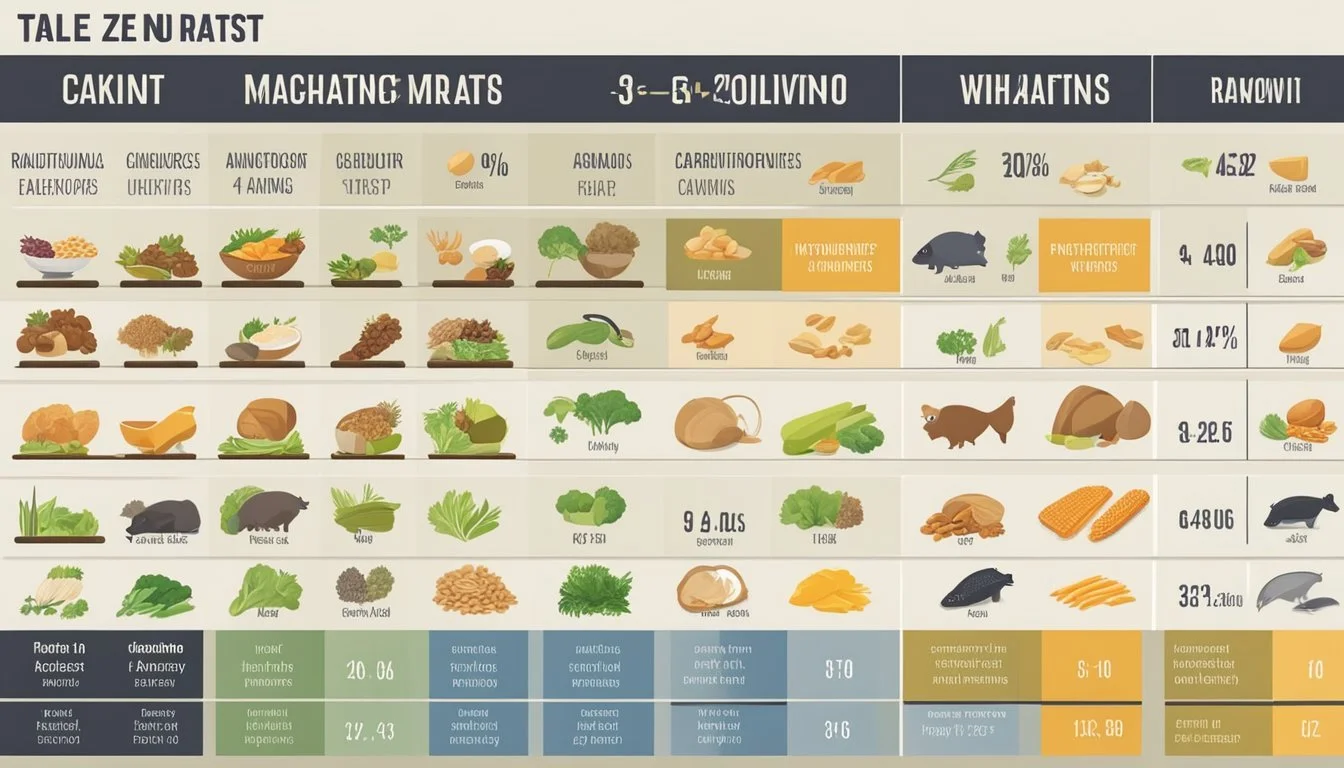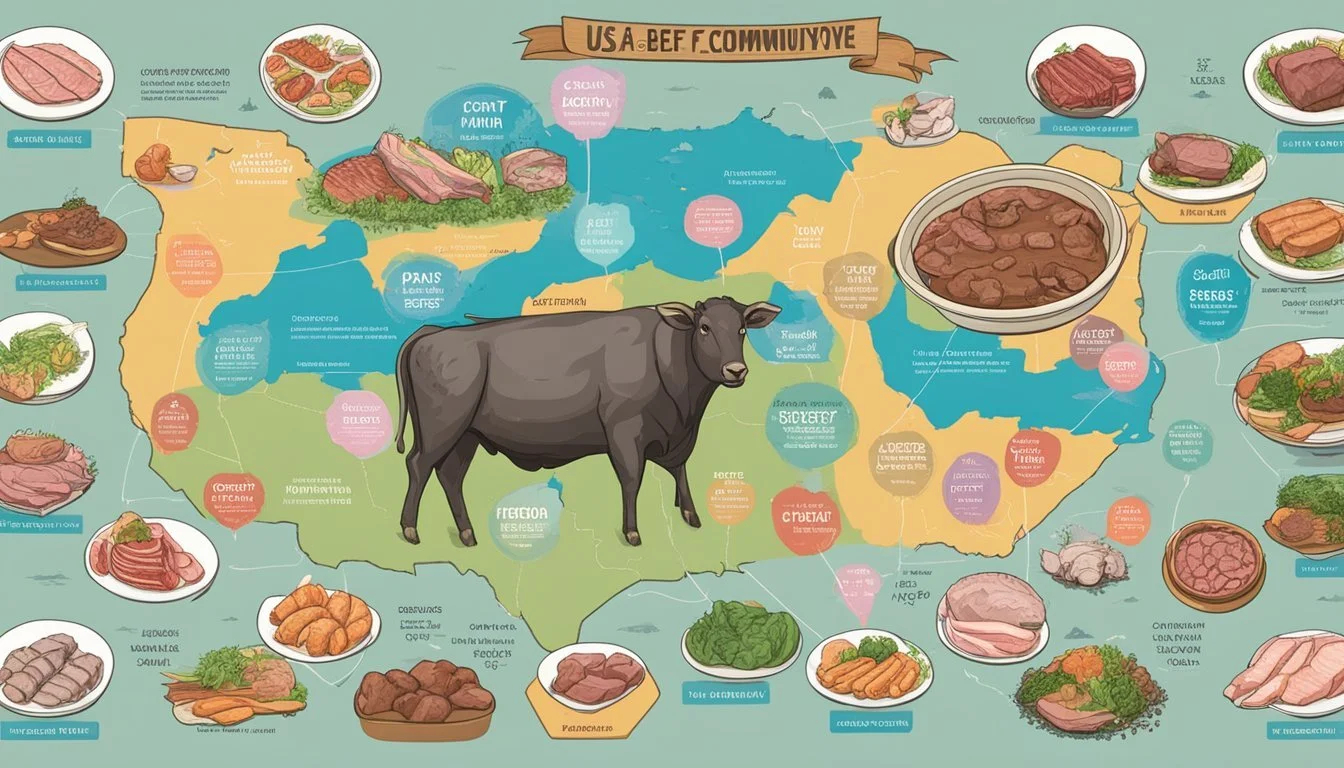Discover Why the US and NZ Stand Out in the Carnivore Community
Unveiling Key Differences
The carnivore diet, characterized by the consumption of primarily animal products, has seen growing popularity in both the US and NZ. People in these countries are drawn to it for various purported health benefits, such as reversing diabetes, improving mental health, and reducing inflammation. Professional communities in the US, including athletes like Curtis Sironen, report significant health transformations, attributing their success to the meat-focused regimen.
New Zealand also showcases a robust carnivore community, where individuals are challenging conventional dietary norms. They are experiencing benefits that range from weight loss to the mitigation of autoimmune conditions. Influential figures, such as Dr. Ovadia, have shared compelling results from both personal experience and studies, enhancing the diet's credibility and following.
In both countries, the carnivore diet's simplicity appeals to those overwhelmed by conventional dietary guidelines. The focus on meat and animal products cuts through the complexity, providing a clear and direct path to potential health improvements. By exploring why the US and NZ lead the way in this dietary trend, readers can uncover insights and motivations driving this unique nutritional movement.
Historical Context of Carnivore Diets in the US and NZ
The history of carnivore diets in the United States and New Zealand reveals distinct evolutionary paths influenced by their cultural and historical contexts. This section explores the movement's evolution, its comparison with the standard American diet, and New Zealand's unique contributions.
Evolution of the Carnivore Movement
In the United States, the carnivore diet has roots tracing back to the 19th century with figures like Dr. James Salisbury. He advocated for a diet centered around meat, particularly ground beef, known today as Salisbury steak. This diet approach was promoted for its health benefits at a time when nutritional science was still developing.
As the movement progressed, it incorporated modern influences, such as the ketogenic diet, emphasizing fat as an energy source. Contemporary advocates credit meat-centric diets for various health benefits. This modern resurgence reflects wider interest in alternative dietary practices, diverging from mainstream nutrition guidelines.
Comparison with the Standard American Diet
The standard American diet (SAD) typically includes a high intake of processed foods, sugars, and carbohydrates. In stark contrast, the carnivore diet focuses exclusively on animal products, including meat, eggs, and dairy. While SAD has been linked to rising rates of obesity and chronic diseases, proponents of the carnivore diet claim it can mitigate such risks by eliminating processed foods and sugars.
Notably, the lack of dietary fiber and potential for nutrient deficiencies in a carnivore diet raises concerns among nutritionists. Nonetheless, some individuals report improvements in energy levels and digestion, attributing these benefits to the simplicity and nutritional density of animal-based foods.
New Zealand's Unique Carnivore History
New Zealand's history with carnivore diets is partly shaped by its indigenous Maori population, who traditionally consumed high-protein diets featuring meat and seafood. The country's rich pastoral heritage and agricultural practices also contribute to the prominence of meat in the local diet.
New Zealanders have embraced the carnivore diet in recent years, supported by the availability of grass-fed, high-quality meat. Advocates in New Zealand often highlight the environmental benefits of local, sustainable farming practices and the health advantages of consuming nutrient-rich animal products. This context provides a distinct perspective within the global carnivore community.
Health Benefits of Carnivore Diets
The carnivore diet is gaining attention for its potential health benefits. These benefits can be seen in various areas, including chronic disease impact, weight management, and mental health improvements.
Impact on Chronic Diseases
Adopting a carnivore diet may influence chronic diseases like heart disease and diabetes significantly. Some individuals report improved blood sugar levels due to a reduction in carbohydrate intake, which can stabilize insulin levels. This dietary shift is particularly relevant for those managing type 2 diabetes.
Moreover, the high intake of animal fats and proteins is claimed to help reduce inflammation markers. Reduced inflammation can mitigate symptoms of autoimmune conditions, although more research is needed to confirm long-term effects. The elimination of plant-based foods reduces exposure to certain allergens that might trigger chronic inflammatory responses.
Weight Management and Obesity Prevention
Weight management is a notable benefit linked with the carnivore diet. Many followers report significant weight loss, primarily due to the satiety provided by high-fat and high-protein foods, reducing overall caloric intake. These nutrients can promote a feeling of fullness.
Animal-based diets eliminate processed foods and sugars, which are common culprits in weight gain. This shift can naturally lead to a caloric deficit, promoting obesity prevention. However, it's important to monitor intake to ensure balanced nutrition, as nutrient deficiencies can occur if the diet is not well-planned.
Mental Health Improvements
Mental health improvements are another area where the carnivore diet shows promise. Some adherents claim reduced symptoms of depression and anxiety. This could be due to stable blood sugar levels, which influence mood regulation. Omega-3 fatty acids found in fish and certain meats are also known to support brain health.
Additionally, eliminating vegetable-based irritants and anti-nutrients may positively affect gut health, which is closely linked to mental well-being. Improved gut health can lead to better neurotransmitter function, further supporting mental clarity and mood stabilization.
By focusing on animal products, the diet aims to provide essential nutrients that support both physical and mental health without the potential downsides of plant-based foods.
Nutritional Breakdown of Carnivore Diets
In the carnivore diet, the focus is on consuming only animal-derived foods, such as meats, fish, and eggs. This dietary approach offers an interesting array of macro and micronutrient profiles different from plant-based diets.
Macro and Micronutrient Profiles
The carnivore diet provides a high intake of protein and fat, with minimal, if any, carbohydrates. This can lead to a state of ketosis, where the body burns fat for fuel. Key nutrients from animal sources include iron, zinc, vitamin B12, and vitamin D.
Iron from red meat is highly bioavailable, making it easier for the body to absorb. Vitamin B12, essential for nerve function and red blood cell production, is also abundant in the carnivore diet. Fat-soluble vitamins such as A, D, E, and K are well represented, supporting various bodily functions.
Nutrient Source Function Iron Red meat Blood production and oxygen transport Vitamin B12 Meat, fish Nerve function and blood formation Vitamin D Fish, dairy Bone health and immune function Protein Meat, eggs Muscle repair and growth
Addressing Concerns of Nutrient Deficiencies
A major concern is the lack of fibre and certain vitamins like vitamin C. Fibre, found in plant foods, is important for digestive health. A complete absence of fruits and vegetables could result in deficiency.
Vitamin C, necessary for collagen synthesis and immune function, is less prominent in carnivore diets. Some animal products like liver contain small amounts of vitamin C, but typically not enough to meet daily requirements. Individuals on the carnivore diet need to be mindful of such deficiencies and consider supplements.
Electrolyte imbalances can also occur due to low carbohydrate intake, which often reduces sodium and potassium levels. Balancing these electrolytes is crucial for maintaining energy and muscle function.
Discover the endless possibilities of buying fiber supplement, vitamin C, and electrolyte supplement online!
Comparison with Plant-Based Diets
Plant-based diets include a variety of foods such as fruits, vegetables, grains, and legumes. These diets provide ample fibre, antioxidants, and phytochemicals, which are typically absent in a carnivore diet.
Protein in plant-based diets comes from sources like beans, lentils, and nuts, which, although diverse, may not be as complete in amino acid profiles compared to animal protein. However, plant-based diets excel in providing vitamin C, vitamin E, and folate, essential for various bodily functions.
While carnivore diets are rich in certain nutrients, they often lack the diversity of nutrients available in plant-based diets. Combining elements from both might help in achieving a more balanced nutrient intake.
Benefits and Challenges of a Meat-Based Diet
The rise of meat-based diets brings both advantages and difficulties. Key areas to explore include the impact of saturated fat on heart health, the role of protein sources in muscle recovery, and the efficacy of elimination diets in managing allergies.
Saturated Fat and Heart Health
Meat-based diets, particularly those centered on red meat, are rich in saturated fats. Saturated fats have been historically linked to an increased risk of heart disease.
Recent studies offer a nuanced view, suggesting that the relationship between saturated fat and heart health may not be as straightforward. Some research indicates that certain saturated fats might not significantly affect heart disease risk. Nevertheless, health experts recommend monitoring saturated fat intake and balancing it with other fats for optimal heart health. Moderation and variety remain key.
Protein Sources and Muscle Recovery
Animal proteins are considered high-quality proteins due to their complete amino acid profiles. Meat-based diets can be particularly beneficial for muscle recovery. The amino acids in meat support muscle repair and growth, making these diets appealing to athletes and individuals engaged in intense physical activities.
Different meats offer varying benefits. For example, beef is high in iron, while fish provides omega-3 fatty acids. An emphasis on diverse protein sources within a meat-based diet can enhance nutrient intake and support overall muscle health and recovery. Proper cooking methods and portion control are essential.
Elimination Diets and Allergies
Meat-based diets can serve as effective elimination diets. By removing common allergens and irritants found in grains, dairy, and certain vegetables, individuals may find relief from persistent allergies and autoimmune conditions.
Ruminant meats, such as beef and lamb, are often less likely to trigger allergic reactions compared to other food groups. These diets aim to simplify food intake, potentially putting chronic conditions into remission. However, it's crucial to monitor nutrient deficiencies and consult healthcare providers when adopting such restrictive diets.
Cultural and Community Aspects
The carnivore communities in the US and New Zealand exhibit unique demographic and cultural characteristics. These aspects impact the behaviors, traditions, and knowledge exchange within these groups.
The Carnivore Community Demographics
The carnivore communities in both the US and New Zealand include a diverse group of individuals. They range in age, background, and professional expertise. In the US, the community is larger due to the country's size, contributing to a broader range of experiences and knowledge.
In New Zealand, the community may be smaller but is equally passionate. Their isolation has led to a tight-knit group with shared experiences and expertise. Both regions include enthusiasts interested in a variety of carnivores, from apex predators to mesocarnivores.
Cultural Significance in the US and NZ
In the US, car culture significantly influences community activities and gatherings. Many events are centered around drive-ins, car shows, and off-roading adventures, which serve as forums for knowledge sharing. This car-centric social fabric often overlaps with the interests of carnivore enthusiasts, fostering a unique blend of subcultures.
New Zealand's cultural landscape, while heavily influenced by its natural settings, shapes how the community interacts. Outdoor activities such as observatories and wildlife parks highlight the importance of conservation and environmental respect. Here, carnivore enthusiasts often intertwine their hobby with broader ecological concerns, leading to a distinct socio-ecological engagement.
Both countries' cultural and community aspects illustrate how regional characteristics shape the interactions and focus of carnivore communities. Whether through large events and gatherings in the US or through integrated conservation efforts in New Zealand, these aspects significantly define the community dynamics.
Practical Advice for Carnivore Dieters
For those interested in the carnivore diet, it is crucial to focus on crafting a balanced meal plan, incorporating variety, and consulting healthcare professionals to ensure nutritional adequacy and safety.
Creating a Balanced Carnivore Meal Plan
When creating a balanced carnivore meal plan, consuming a variety of animal products is essential to meet nutritional needs. Include muscle meats like beef, chicken, and pork, along with organ meats such as liver and kidney, which are rich in essential vitamins and minerals. Eggs and fish provide additional nutrients like choline and omega-3 fatty acids.
A sample daily menu might look like this:
Breakfast: 4-ounce ribeye, two eggs, bacon cooked in butter
Lunch: 3 ounces of salmon, 6 ounces of shrimp
Dinner: 2 ounces of liver, 4 ounces of chicken thighs
Keep portion sizes moderate and ensure meals provide a balance of macronutrients.
Incorporating Variety and Avoiding Monotony
Incorporating variety in a carnivore diet helps prevent boredom and ensures a range of nutrients. Rotate different types of meats; for instance, include beef one day, poultry the next, and fish another day. Diversifying preparation methods—such as grilling, broiling, or slow-cooking—also enhances flavor and texture.
Avoiding monotony also involves exploring cuts of meat you may not typically consume. Using spices and herbs, while minimal in a strict carnivore diet, can help enhance dishes without adding plant-based ingredients.
Consultation with Health Professionals
Before starting the carnivore diet, consulting with a registered dietitian or healthcare provider ensures that dietary changes are safe and meet individual health needs. Regular monitoring of blood tests and overall health is advisable to catch potential deficiencies early.
Healthcare professionals can help tailor the diet, suggest necessary supplements (like vitamin D or omega-3s), and address specific health conditions. This approach is particularly important for individuals with underlying health issues or who are pregnant, breastfeeding, or have specific nutritional requirements.
Lifestyle and Carnivore Diet
Adopting the carnivore diet involves not just changes in eating habits but also adjustments to other aspects of daily life. Key areas include exercise plans, meal timing, and strategies for long-term maintenance.
Exercise Plans for Carnivore Dieters
Those following the carnivore diet often focus on strength and resistance training. This is due to the diet's high protein intake, which supports muscle growth and recovery. Weightlifting, bodyweight exercises, and high-intensity interval training (HIIT) are popular choices.
Endurance exercises, like prolonged cardio, may be less emphasized initially. Some carnivore dieters report improved energy levels for longer workouts over time. Personalized exercise plans focus on individual goals and capabilities. It's crucial to ensure adequate hydration and electrolytes, particularly during intense training sessions.
The Role of Fasting and Meal Timing
Fasting plays a significant role in the lifestyle of many carnivore diet followers. Intermittent fasting (IF), where eating is limited to a specific window each day, is common. Popular methods include the 16/8 method (16 hours fasting, 8 hours eating) and OMAD (one meal a day).
Fasting may help with hunger regulation, promoting a sense of satiety that leads to eating fewer meals. Timing meals around daily activities and workouts can optimize energy and recovery. Combining intermittent fasting with the carnivore diet may enhance metabolic flexibility and fat utilization.
Long-Term Maintenance and Adaptation
Maintaining the carnivore diet long-term requires adjustments and monitoring. Nutrient balance is essential, ensuring sufficient intake of vitamins and minerals primarily from animal sources. Regular blood tests can help track nutrient levels and overall health.
Adaptation times vary; some may experience initial challenges like the "keto flu." Gradual introduction and listening to one's body can ease this transition. Optimization involves personalized adjustments like adding occasional non-carnivore foods if necessary. Building a supportive community and staying informed on the latest research can aid in successful long-term adherence.
Environmental Impact and Ethical Considerations
Addressing environmental impact and ethical considerations is essential when discussing the carnivore community, especially in regions like the US and New Zealand. Key issues include ecosystem preservation, responsible hunting practices, and managing habitat loss and animal treatment.
Conservation and Ecosystem Impact
Conservation is vital in both the US and New Zealand, where diverse ecosystems face various threats. Hunting practices must align with conservation goals to prevent negative impacts.
In the US, conservation programs often work alongside hunting regulations to maintain sustainable populations. New Zealand, known for its unique fauna, emphasizes controlling invasive species that threaten native wildlife.
Strategic conservation efforts protect biodiversity, ensuring that hunting does not disrupt ecological balance. Collaborative efforts between government bodies, conservationists, and hunters are crucial for success.
Ethical Hunting and Meat Consumption
Ethical hunting involves practices that prioritize animal welfare and sustainable population management. Ethical hunters respect hunting seasons, use humane methods, and support conservation efforts.
In the US, organizations advocate for ethical hunting, promoting education and awareness. Hunters are encouraged to use all parts of the animal to minimize waste and respect the animal's life.
New Zealand's approach includes strict regulations and permits for hunting, ensuring practices align with ethical standards. Sustainable meat consumption principles guide hunters to focus on non-native species, lessening the ecological impact on native wildlife.
Addressing Habitat Loss and Animal Treatment
Habitat loss poses a significant threat to wildlife in both countries. Urban expansion, deforestation, and agricultural development contribute to this issue.
Efforts to address habitat loss include reforestation projects, creating protected areas, and promoting responsible land use practices. These initiatives help maintain essential habitats for wildlife populations.
Animal treatment in the context of hunting involves ensuring that practices are humane and minimize suffering. Both the US and NZ have regulations to protect animal welfare, emphasizing the importance of ethical treatment.
Effective habitat management and ethical hunting practices together play a crucial role in sustaining healthy wildlife populations and preserving natural ecosystems.
Popularizing the Carnivore Diet
The carnivore diet's popularity has surged due to the influence of various media platforms, the availability of specialized recipes, and advocacy from well-known public figures. These elements have contributed significantly to the diet's visibility and acceptance.
Influence of Media and Podcasts
Media outlets and podcasts have played a pivotal role in popularizing the carnivore diet. High-profile shows often feature in-depth discussions with diet experts and enthusiasts, bringing the diet's principles to a broader audience. Podcasts focused on low-carb and carnivore lifestyles regularly feature testimonials and scientific discussions, providing valuable insights.
For instance, podcast host Joe Rogan has discussed his experiences with the diet, sparking curiosity and debate among listeners. This kind of media attention helps demystify the diet, presenting it as a viable, albeit extreme, nutritional choice.
The Rise of Carnivore Diet Recipes
The availability of recipes tailored to the carnivore diet has made it more accessible. Recipe collections specifically for the carnivore diet, such as those for the Lion Diet variant which focuses on ruminant meat, salt, and water, cater to the needs of those wanting simpler meal plans.
Online platforms and cookbooks offer a variety of creative dishes that adhere strictly to carnivore principles. These resources make it easier for individuals to follow the diet without feeling deprived of culinary variety. From beef liver pate to bone broth, these recipes ensure nutritional needs are met while keeping meals interesting.
Public Figures and Diet Advocacy
Advocacy from public figures has significantly boosted the diet's popularity. Celebrities and influencers who openly follow and promote the carnivore diet lend it a sense of credibility and appeal. Shawn Baker, an orthopedic surgeon and prominent advocate, attributes his health transformation to this diet.
Similarly, fitness personalities and social media influencers actively share their carnivore journeys, providing inspiration and practical advice. Their endorsements and personal stories offer relatable narratives that encourage others to explore the diet, breaking down misconceptions and promoting its benefits.
Medical Perspectives and Research
Recent studies and medical opinions have highlighted both the potential benefits and controversies surrounding the carnivore diet, particularly its effects on illness remission and long-term health.
Studies on Carnivore Diet and Illness Remission
Research has shown mixed results on the effectiveness of the carnivore diet in treating various illnesses. Some studies indicate that patients with autoimmune diseases, such as rheumatoid arthritis and lupus, have experienced symptom remission and reduced inflammation. Others report improvements in irritable bowel syndrome (IBS), citing reduced gastrointestinal distress and enhanced bowel regularity.
For instance, a clinical trial focusing on a meat-only diet found that participants reported significant relief from IBS symptoms within weeks. This suggests potential therapeutic benefits. However, experts caution that more extensive, peer-reviewed research is necessary to validate these findings comprehensively.
Medical Opinion on Long-Term Health Effects
Medical professionals remain divided on the long-term health implications of the carnivore diet. Proponents argue that a diet rich in animal products can lead to improved metabolic health, weight loss, and reduced risk of certain chronic diseases. They point to anecdotal evidence and short-term studies highlighting these benefits.
Conversely, critics raise concerns about potential risks such as nutrient deficiencies, especially in fiber, vitamins, and minerals typically found in plant-based foods. The lack of dietary diversity may also contribute to cardiovascular issues over time. Longitudinal studies are essential to determine the full scope of health outcomes associated with prolonged adherence to this diet.
The Role of Medications and Diet in Treatment
Medications and diet often play complementary roles in the management of chronic conditions. For cancer patients, for example, dietary adjustments, including increased protein intake from meat, may support recovery and overall health. However, this should not replace conventional treatments like chemotherapy or immunotherapy.
In cases of autoimmune diseases, some patients on a carnivore diet report reduced reliance on immunosuppressive medications. This dietary approach can also influence medication effectiveness and side effects. Healthcare providers typically recommend a balanced approach, integrating both pharmacological treatments and dietary modifications tailored to individual needs.
Overall, the relationship between diet and medication is complex. Personalized medical advice from healthcare professionals remains crucial in optimizing health outcomes.
Facing Misconceptions and Criticism
Many misconceptions and criticisms surround the carnivore diet, especially concerning its exclusion of fruits, vegetables, and grains. Below, the article addresses these points and presents logical arguments supporting this dietary choice.
Addressing the Fruit and Vegetable Myth
A common criticism of the carnivore diet is its exclusion of fruits and vegetables, deemed essential for nutrients and fiber. Proponents argue that animal products provide all necessary nutrients. For example, they cite organ meats like liver for vitamins A and B.
Additionally, critics claim that fiber from plants is crucial for digestive health. Yet, many on the carnivore diet report improved digestion without fiber. They suggest that plant toxins and antinutrients can be problematic.
Combatting Myths Around Processed Foods and Grains
Processed foods and grains are staples in many diets but are often criticized within the carnivore community. They believe these foods can cause inflammation and other health issues. Evidence suggests processing can strip grains of nutrients and add harmful chemicals.
Carnivores prefer whole, unprocessed animal products, arguing they’re more nutrient-dense. For instance, beef, fish, and eggs provide proteins, fats, and essential vitamins without additives found in processed foods.
Logical Arguments for a Carnivore Diet
Supporters of the carnivore diet use various logical arguments to defend their choices. Firstly, they argue that humans evolved as meat-eaters, and the modern diet is a deviation. They point to historical and anthropological evidence showing early human diets primarily consisted of animal products.
They also argue that a diet solely of animal products simplifies nutrition. Individuals report better health outcomes and easier weight management. This simplicity avoids confusion over what constitutes a healthy diet.
In summary, addressing misconceptions about the essentiality of fruits and vegetables, debunking myths around processed foods and grains, and presenting sound logical arguments help advocate for the carnivore diet effectively.
Conclusion
The carnivore diet has garnered significant attention in both the United States and New Zealand, with robust communities advocating for its benefits.
Calorie Deficit:
Adherents often emphasize the diet's ability to promote a calorie deficit, leading to weight loss. By eliminating high-calorie, sugar-rich foods, individuals may find it easier to control their intake.
Community Support:
Both countries boast supportive communities that share experiences and tips. This camaraderie helps individuals stay motivated and committed to their dietary choices. Online forums and social media play a key role in fostering these connections.
Health Outcomes:
Supporters in the US and NZ report various health improvements, such as autoimmune disease remission and better metabolic health. These anecdotal claims highlight the importance of monitoring and sharing personal health journeys within the community.
Challenges:
Critics caution against potential risks, such as the absence of dietary fiber, which is known to be essential for preventing conditions like diabetes and heart disease. Balanced nutrition education remains crucial for those considering this diet.
The enthusiasm for the carnivore diet in the US and NZ illustrates a broader trend of exploring alternative dietary frameworks. The community-driven approach in both nations underscores the role of shared experiences in shaping health and wellness practices.














